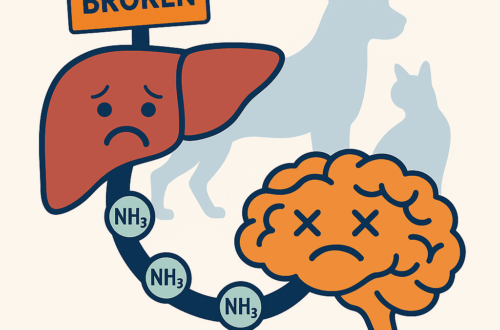A common reason for which dogs are referred to me for further evaluation is an elevated blood calcium level (called hypercalcemia). Sometimes affected patients are incredibly sick while others have no outward clinical signs of illness. An accurate diagnosis of the underlying cause of a dog’s hypercalcemia is truly important. This week I review the major causes of hypercalcemia in dogs, as well as some of the tests a veterinarian may recommend for affected canine fur babies. Happy reading!
Hypercalcemia – What causes this abnormality?
There are multiple potential causes of hypercalcemia in dogs, and thorough diagnostic investigation is needed. Cancers are the #1 cause of hypercalcemia in dogs. While any cancer may theoretically cause elevated blood calcium levels, certain ones are over-represented, particularly lymphoma and anal gland cancer.
Other major possible causes include:
- Hyperparathyroidism: The parathyroid glands are located in the neck, and are responsible for helping regulate calcium and phosphorus balance in the body. When these glands secrete too much parathyroid hormone, blood calcium levels often rise and blood phosphorus levels tend to decrease.

- Hypoadrenocorticism: Also known as Addison’s disease, this disorder of the adrenal glands is often associated with high blood calcium levels in affected dogs.
- Kidney disease: Any metabolic insult or toxin that acutely damages the kidneys can cause high blood calcium. A common example is ingestion of ethylene glycol, more commonly known as anti-freeze. Additionally some patients with chronic kidney disease develop elevated blood calcium levels.
- Ingestion of excess vitamin D: Certain vitamins and human medications (e.g.: psoriasis ointments) contain vitamin D. When vitamin D is ingested in excess, blood calcium levels can be affected due to the complex relationship between the two in the body.

- Bone destruction: The major mineral component of bones is calcium. Any disease process that causes meaningful damage to bone can cause the release of extra calcium into the bloodstream.
- Fungal infections: In certain parts of the USA, infections caused by fungi readily cause hypercalcemia. These fungal infections include blastomycosis, histoplasmosis, and coccidioidomycosis (also known as Valley Fever).
- Dehydration: When dogs don’t drink enough water, they can become dehydrated quickly, a finding that can be associated with mild elevations of total blood calcium.
- Idioapathic: In some patients with hypercalcemia we never figure out what causes the abnormality. Medically we use the term ‘idiopathic’ to describe this scenario; this is essentially the professional way of saying “we don’t know why.”
Hypercalcemia – How is it diagnosed?
The initial documentation of high blood calcium is relatively straightforward. After performing a complete physical examination, a veterinarian will order a non-invasive blood test called a serum biochemical profile. This test measures a form of calcium in the blood called total calcium (tCa). I am advocate for documenting a persistence of hypercalcemia with follow-up testing; simply I recommend evaluating a second fresh blood sample to ensure the abnormality is repeatable before pursuing more extensive testing.
If a total blood calcium level is persistently elevated, then further diagnostic investigation is absolutely warranted. Remember the #1 cause of hypercalcemia in dogs is cancer so I advocate for being as proactive as possible. Partnering with a board-certified veterinary internal medicine specialist can be invaluable for developing an efficient and cost-effective plan for determining the cause of a pet’s high blood calcium level. A veterinarian will invariably ask you a myriad of questions about your pet’s medical past, including travel history, current medications, and diet. As always, it is exceedingly vital you provide truthful and comprehensive answers to these important questions to help ensure your pet is diagnosed accurately.
Tests that may be recommended include:
- Measurement of ionized blood calcium: Ionized calcium (iCa) is different from total calcium in that the former is considered the active form of calcium in the body. Ionized calcium is involved in various metabolic processes. Total and ionized blood calcium levels can change differently depending on the underlying disease process.
- Measurement of parathyroid hormone related peptide: This unique blood protein, often abbreviated PTHrp, is elevated in many patients living with cancer, specifically lymphoma.
- Measurement of blood vitamin D levels: A finding of an elevated blood vitamin D level should prompt investigation for possible sources of excess exposure to this vitamin.
- Blood & urine kidney values: Kidney function may be evaluated to screen for evidence of renal injury.
- Measurement of parathyroid hormone: Parathyroid hormone (PTH) level is often elevated (or at least inappropriately normal) in patients living with primary hyperparathyroidism.
- Diagnostic imaging: Obtaining radiographs/x-rays of the chest and bones, as well as performing sonography of the abdomen, may be recommended for patients with persistently elevated blood calcium levels in an effort to look for evidence of cancerous processes and/or bone damage.
- Screening for fungal infections: If you live in a part of the country where fungal infections are common, a veterinarian may recommend simple blood and urine tests to screen for certain fungal organisms.
- Testing for Addison’s disease: A simple blood test called an ACTH stimulation test can be performed to definitively screen a patient for Addison’s disease.
Hypercalcemia – How is it treated?
Effective treatment of hypercalcemia is entirely dependent on the actual cause of a patient’s high blood calcium level. For this reason, a thorough diagnostic investigation is invariably necessary. The treatment for lymphoma is entirely different than the treatment for hyperparathyroidism. Similarly therapy for a fungal infection is vastly different than that for kidney injury. Consulting with a board-certified veterinary internal medicine specialist can be particularly helpful when trying to determine the best way to treat a dog with hypercalcemia.
The take-away message about hypercalcemia…
Elevated blood calcium levels, also called hypercalcemia, is relatively common in dogs. The #1 cause of high blood calcium in this species is cancer. However other possibilities exist; therefore a thorough diagnostic investigation is recommended. Working with both your family veterinarian and a board-certified veterinary internal medicine specialist is often exceedingly helpful for progressing through the diagnostic and therapeutic processes efficiently and in a financially responsible manner.
To find a board-certified veterinary internal medicine specialist, please visit the American College of Veterinary Internal Medicine.
Wishing you wet-nosed kisses,
cgb




